Software > Compilers
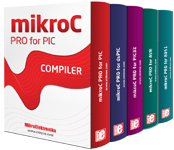 |
High-level software for producing microcontroller code.
PIC, AVR, ARM and 8051 compilers are available in C, BASIC and Pascal variants.
Other software applications, such as visual tools for for working with graphic LCDs and touch-screens, are also available.
|

Accessory Boards
 |
Boards which can be used to add additional functionality to your design.
A very large variety are available, from accelerometers to GSM/GPRS modules.
Boards may feature an interface standard, such as IDC10 or mikroBus, which makes it easy to connect them to Development Systems or other boards which also feature that connection standard.
|

Archive > Proteus > Circuit Simulation > Microcontroller Simulation
 |
Microcontroller simulation entails the in-circuit (in-schematic) emulation of a microcontroller, with your code loaded into it.
A large peripheral library and extensive debugging features (such as breakpoints / watches) are available.
Prototyping your design "in cyberspace" can help reduce or eliminate the cost of physical prototypes, greatly speed up code-development, and provide extensive debugging capabilities which would not otherwise be available.
|
 |
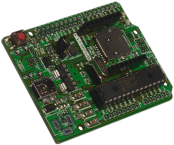
|
|
Breeze boards are versatile development boards for 28-pin PIC microcontrollers. Use them for learning, for rapid prototyping of your next project, or as the core board in your final product.
The Breeze A includes a USB-UART converter, for easy serial communication with a computer. |
|
|
|
 |
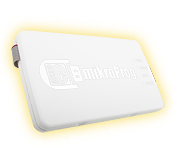
|
|
Programs almost any PIC, from PIC10 to PIC32. |
|
|
|
 |
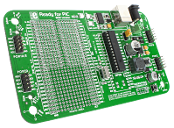
|
|
Ready for PIC features all the basic components needed to start developing a microcontroller application using 28- and 40-pin PIC MCUs. Included is a PIC18F25K22 connected to a replaceable 8MHz crystal oscillator. The microcontroller's ports are exposed via four MikroElektronika-standard IDC10 headers to which add-on boards can be easily connected. A USB-UART module, prototyping area and a power supply circuit which can provide either 5V or 3.3V are also featured on the board.
The included PIC18F25K22 is pre-programmed with a USB bootloader, which means that no external programmer is required in order to use it. |
|
|
|
 |
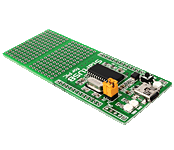
|
|
Start USB for PIC Board is a small development board featuring the Microchip PIC18F2550 device with fast USB 2.0 support. It features connection pads for all MCU pins, as well as two prototyping areas for placing additional devices and components. It comes with a USB bootloader (no additional programmer necessary) and can be used as a standalone device. |
|
|
|
 |

|
|
PIC clicker is a compact and cost-effective board, featuring the PIC18F47J53 microcontroller as well as a mikroBus socket for easily connecting "click" accessory boards (3.3V I/O levels). It also features a USB connector, two LEDs and two push buttons, mikroProg programming connector and an expansion header. The board comes pre-loaded with a fast USB HID bootloader. |
|
|
|
 |
|

